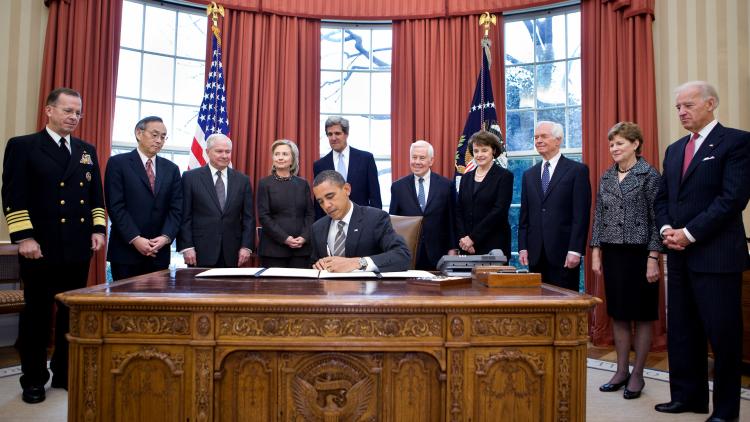By Libby Flatoff and Shizuka Kuramitsu
The writers are program and research assistants at the Arms Control Association (ACA). This article first appeared in ‘Arms Control Now’ of the ACA and is being reproduced with their permission.
WASHIGNTON, D.C. | 7 February 2024 (IDN) — With less than two years to go before the expiration of the last remaining treaty limiting the world’s two largest arsenals, Russian leaders continue to reject U.S. offers to discuss a new nuclear arms control framework.
In late December, Russia sent a diplomatic paper rejecting the United States’ proposal to resume arms control talks, according to U.S. officials, and Russia’s foreign minister announced January 18 that Russia was interested in talks on a new arms control framework to supersede the New Strategic Arms Reduction Treaty (New START), which expires February 5, 2026.
In a speech on January 17, Russian Foreign Minister Sergey Lavrov said that “amid a ‘hybrid war’ waged by Washington against Russia, we aren’t seeing any basis, not only for any additional joint measures in the sphere of arms control and reduction of strategic risks, but for any discussion of strategic stability issues with the United States.”
U.S. proposal rejected without a Russian counterproposal
In response to a question at an event hosted on January 18 by the Center for Strategic International Studies, Pranay Vaddi, senior director for arms control at the White House National Security Council, said “I think that they will want to come back to the table at some point, and ideally before expiration, but Russia could also be unpredictable.”
Vaddi stated that not only was the proposal rejected, but also, there was no counterproposal presented, thus Russia is undermining the spirit of Article VI of the Nonproliferation Treaty (NPT). By not even offering a counterproposal, “Russia is minimizing their obligations under the NPT” and not even attempting “to pursue negotiations in good faith”, Vaddi added.
The U.S. proposal was first announced by White House National Security Advisor Jake Sullivan at the June 2, 2023, annual meeting of the Arms Control Association. Sullivan declared that the United States is ready to engage in nuclear arms control diplomacy with Russia and with other nuclear-armed members of the NPT “without preconditions.”
Sullivan suggested that “rather than waiting to resolve all of our bilateral differences, the United States is ready to engage Russia now to manage nuclear risks and develop a post-2026 arms control framework”.
The first reaction was promising
Russia’s first reaction to the proposal was promising. On June 5, Kremlin spokesperson Dmitry Peskov said that Russia remains open to dialogue with the United States on arms control. He described Sullivan’s comments as “important and positive”, but said Russia wants to learn more about the proposal through formal diplomatic channels. A few months later, the Biden Administration followed up with a diplomatic non-paper on the Sullivan proposal.
By August 2023, however, Russian officials had already started signalling that, in their view, nuclear arms control talks “cannot be isolated from the general geopolitical and military-strategic context”, which includes the conflicts in Ukraine.
Despite this attitude and its decision to suspend implementation of New START, Russia pledged, in a Statement at the First Session of the Preparatory Committee for the 11th Review Conference of the Parties to the NPT in July 2023 that it will “continue to adhere to the central quantitative limits stipulated in the New START Treaty, inform the United States of launches of ICBMs and SLBMs through an exchange of relevant notifications, and observe a unilateral moratorium on the deployment of ground launched intermediate- and shorter-range missiles”.
However, Russia warned, “this moratorium is under serious pressure in view of the Pentagon’s active preparations for the deployment of ground-launched intermediate- and shorter-range missiles in Europe and the Asia-Pacific region”. [IDN]
Photo: President Barack Obama signed the instrument of ratification of the New START Treaty in the Oval Office, February 2, 2011. Participants included then-Vice President Joe Biden. Source: Official White House Photo by Chuck Kennedy)


